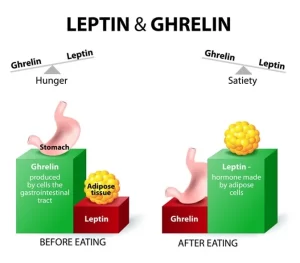 In the second part of this crucial and very relevant topic in the current times, we get greater insights into the connect between hormones, belly fat and the struggle to lose weight. (If you missed last week’s article, it is available for you to read online at www.parsi-times.com).
In the second part of this crucial and very relevant topic in the current times, we get greater insights into the connect between hormones, belly fat and the struggle to lose weight. (If you missed last week’s article, it is available for you to read online at www.parsi-times.com).
Adrenal Stress: The Root Cause Of Belly Fat:
Hormones are crucial in directing metabolic functions. Organs like the thyroid and adrenal glands respond by releasing more hormones to maintain balance. However, if one hormone or organ isn’t functioning properly, it can disrupt the entire process and adversely affect fat-burning. Cortisol figures as a common hormone imbalance, contributing to visceral belly fat.
How Does Cortisol Contribute To The Development Of Belly Fat?
Research has extensively explored the relationship between cortisol and weight, and discovered a significant association between elevated cortisol levels and increased body weight. When cortisol levels are high, and you are experiencing stress, hormonal belly fat in both, men and women, can become difficult to reduce.
How To Get Rid Of Hormonal Belly:
Last week we discussed 2 of the 5 Indicators of How Your Hormones Cause Weight Gain – namely: (I) ‘Lack Of Satisfaction Following A Meal’ and (II) ‘Constantly Feeling Anxious/Stressed’. The following are the remaining three:
(III) Your Abdominal Area Is The Only Part Of Your Body Where You Have Gained Weight: Menopause often leads to weight gain because oestrogen and other hormone productions decrease. Low oestrogen levels can also result from excessive exercise, disorderly eating patterns or pituitary gland issues. This imbalance affects fat distribution leading to abdominal weight gain, and interferes with insulin regulation, causing hormonal belly fat.
Tips to work on this: To combat hormonal belly fat resulting from low oestrogen and insulin resistance, it is beneficial to adopt a low-carbohydrate eating plan. Of the three macronutrients, carbohydrates have the greatest impact on raising blood sugar and insulin levels. To achieve weight loss, reducing high-carbohydrate foods like refined sugars, bread, cookies, crackers, and pasta, while increasing the intake of fibre, protein, and healthy fats can be helpful. It’s essential to note that if carbohydrate consumption becomes too low, it can lower your leptin levels and affect leptin’s ability to regulate your reproductive hormones. Therefore, it’s vital to incorporate some whole-food sources of complex carbohydrates into your diet, such as fruit, starchy vegetables, and whole grains.
(IV) You Have Higher Sugar Cravings: If you experience constant sugar cravings, it could indicate that your body is struggling with insulin resistance. This condition hinders the proper absorption of sugar from the bloodstream by your cells, leaving them starved for carbohydrates. Insulin resistance also impacts leptin levels, causing your body to produce more of the hormone. However, high levels of leptin won’t make you feel satiated. Instead, these lead to cellular resistance to the hormone, similar to the effects of elevated insulin levels. With reduced sensitivity to both – insulin and leptin, these regulatory hormones fail to recognize when it’s time to stop eating, leading to continued sugar cravings, thus contributing to hormonal belly fat.
Tips to work on this: Engaging in High-Intensity Interval Training (HIIT) can improve your leptin sensitivity, which refers to how well your cells respond to the presence of leptin and helps you feel fuller faster. HIIT workouts increase the number of leptin receptors on fat cells, leading to an improvement in leptin sensitivity. This, in turn, enables your body to recognize when leptin is secreted and functions properly to signal fullness. In addition to boosting leptin sensitivity, HIIT workouts are also effective in burning calories post-workout and are recommended 2 – 3 times a week, with rest days, under professional guidance,
(V) You Are Hungry All The Time: Ghrelin, or the ‘hunger hormone’ plays a crucial role in regulating your appetite and signalling when it’s time to eat. For instance, if you decide to fast the entire day, your body starts producing ghrelin to prompt you to eat again. Conversely, if you indulge in a candy binge, your stomach will detect the overconsumption and reduce ghrelin secretion. Studies indicate that weight gain can disrupt the normal secretion of ghrelin. Obese individuals, for example, tend to have lower levels of ghrelin and higher levels of leptin in circulation. Surprisingly, having high levels of leptin does not always reduce one’s appetite. Instead, when leptin levels are persistently elevated, it can impair the function of leptin receptors in the brain, which fail to receive the signal of satiety. This hormonal imbalance can confuse your hunger signals, leading to overeating and persistent belly fat.
Tips to work on this: Having sound sleep is crucial for regulating the secretion of ghrelin in your body. If you are sleep-deprived, your ghrelin levels may increase, making it difficult for you to resist food cravings. To reduce your caloric intake and cravings for carbohydrate-heavy foods, it is recommended to get 7 to 9 hours of quality sleep every night. You can make it easier to go to bed by establishing a sleep routine that you look forward to, rather than dread. This could include turning off your electronic devices, reading a book, drinking a cup of tea, and preparing yourself for a restful night’s sleep.

In conclusion, hormonal imbalances can contribute to the accumulation of belly fat. Factors such as stress, menopause, and thyroid dysfunction can lead to changes in hormone levels that affect metabolism, insulin regulation, and fat distribution. Adopting healthy lifestyle habits, such as regular exercise, stress reduction techniques, and a balanced diet, can help restore hormonal balance and reduce belly fat. You are not alone! Work with a professional to get the best of your health!
- The Parsi Woman’s Guide To Superfoods For Hormonal Health - 8 March2025
- Strengthen Your Constitution This Republic Day! - 25 January2025
- Become A ‘Smart Sipper’ This Festive Season! - 28 December2024
